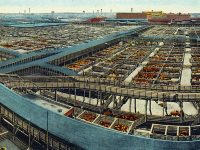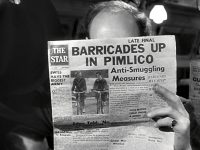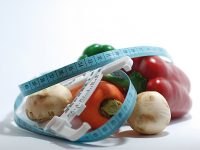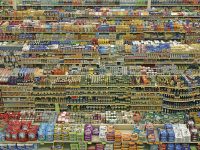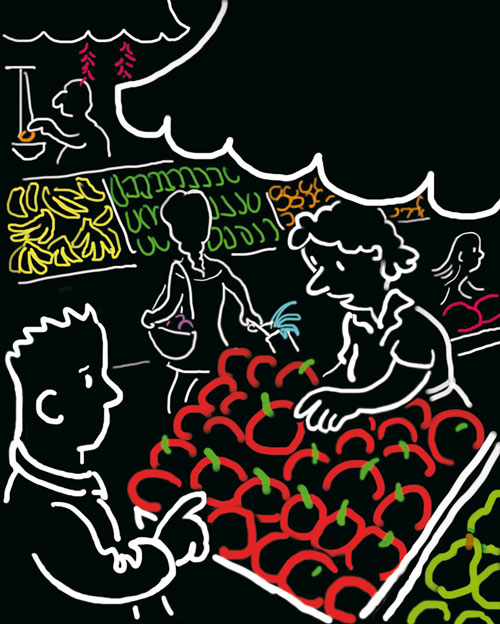
Illustration: Anna Sanchis
One fine day I found I had a Mediterranean diet. Just as Molière’s character, who was happy to learn he was speaking in prose, I experienced the satisfaction of right and proper eating. Up to that moment, since I was a little boy, I merely had fish and vegetables naturally, ate little meat (among other things because it was scarce on post-war dining tables) and absentmindedly dressed everything with olive oil. That was normal. What’s more, I thought oil was always olive oil. Oil, olive: you can see all is one. Perchance there were other kinds of oil, maybe not as healthy…?
It turns out humankind feeds wrong. In dietary terms, I mean. People eat what they can, actually. For centuries, the concern was not to eat properly, but just to be able to eat. In the Mediterranean and anywhere else. In a small restaurant in Nicaragua I asked what was for lunch, and the answer was «food». Not meat nor fish; not stew, nor fried; no starters or mains. They had «food». Nicaragua is the country of the all-day gallopinto, that is, a main of rice and beans, possibly together with some bits of animal protein. Sometimes you may have a «sopón de plátano» (banana soup). I remember a boy enjoying it and saving for last a scaly chicken leg floating on his «sopón de plátano con garra de pollo» (banana soup with chicken leg), true haute cuisine.
In this, our corner of the world, loaded with time, we made a virtue out of necessity. We do not eat a lot of meat because our livestock and poultry are limited (unlike Patagonian «peones de estancia» – southern cowboys –, who have asado for breakfast). We fry with olive oil because we can barely sniff butter (unlike northerners, who bathe in it). We eat fruit and vegetables because our gardens provide it all year round (unlike Andeans, who resort to «chuño», dried potato). And so on. But the gods were born in Greece, so it turns out those few things we have are good. Even oily fish, deep-sea fauna prone to form abundant schools, is now praised by dieticians.
«Now that we have globalised edible biodiversity, we have deteriorated our agronomic assortment. We can find everything in the market, yet there are very few different classes»
We gradually added import vegetables, too. Tomatoes or beans, for instance. And, of course, potatoes. Even oranges. James I of Aragon fed on broad beans, artichokes and turnips, instead of the traditional bread with tomato. I think maybe he was not a good patriot. Chocolate, coffee and sugar were not present either on his majesty’s table. Some basic things sweetened with honey or eastern spices, at the most. That is why Colon was so obsessed. From Genoa or Catalonia, he was heading for pepper, clove and cinnamon. He bumped into America, what a happy mistake.
The surprising part is that now that we have globalised edible biodiversity, we have deteriorated our agronomic assortment. We can find everything in the market, yet there are very few different classes. We find the same apples everywhere («golden», «fuji», «starking» and that’s it), but looking for «reinettes», «winesap» or «russet» is usually a waste of time. In farmers’ stands you can still find «bosc», «seckel» or «bartlett» pears, as well as «mirabelle» or «damson» plums, but those are exceptions: most people will eat «conference» pears and «umeboshi» plums. It turns out we are losing the variety we had in the transgenic whirlwind. There are dozens of potato species and subspecies, and thousands of varieties, but the collection in the market is limited: «kennebec», «pontiac» and not much more; even «buffet» potatoes, which we appreciated so much some years ago, have become a rarity.
Jaundiced from factory-baked products and greasy burgers, from chips and Coca-Colas, a lot of people need to start a diet because of their imbalanced diet. A fat problem… Those of us who eat Mediterranean unknowingly are astonished by this turn of events.


